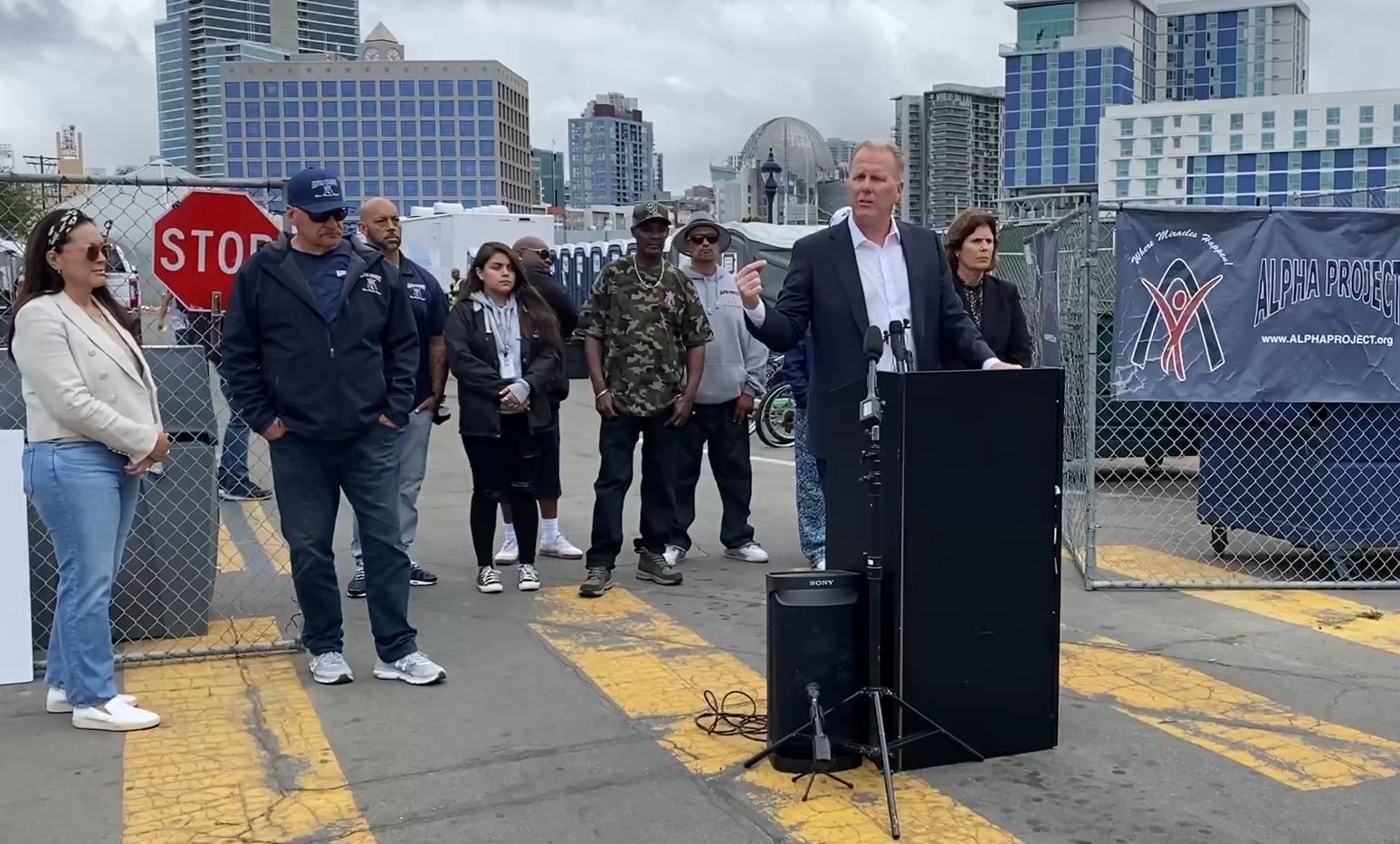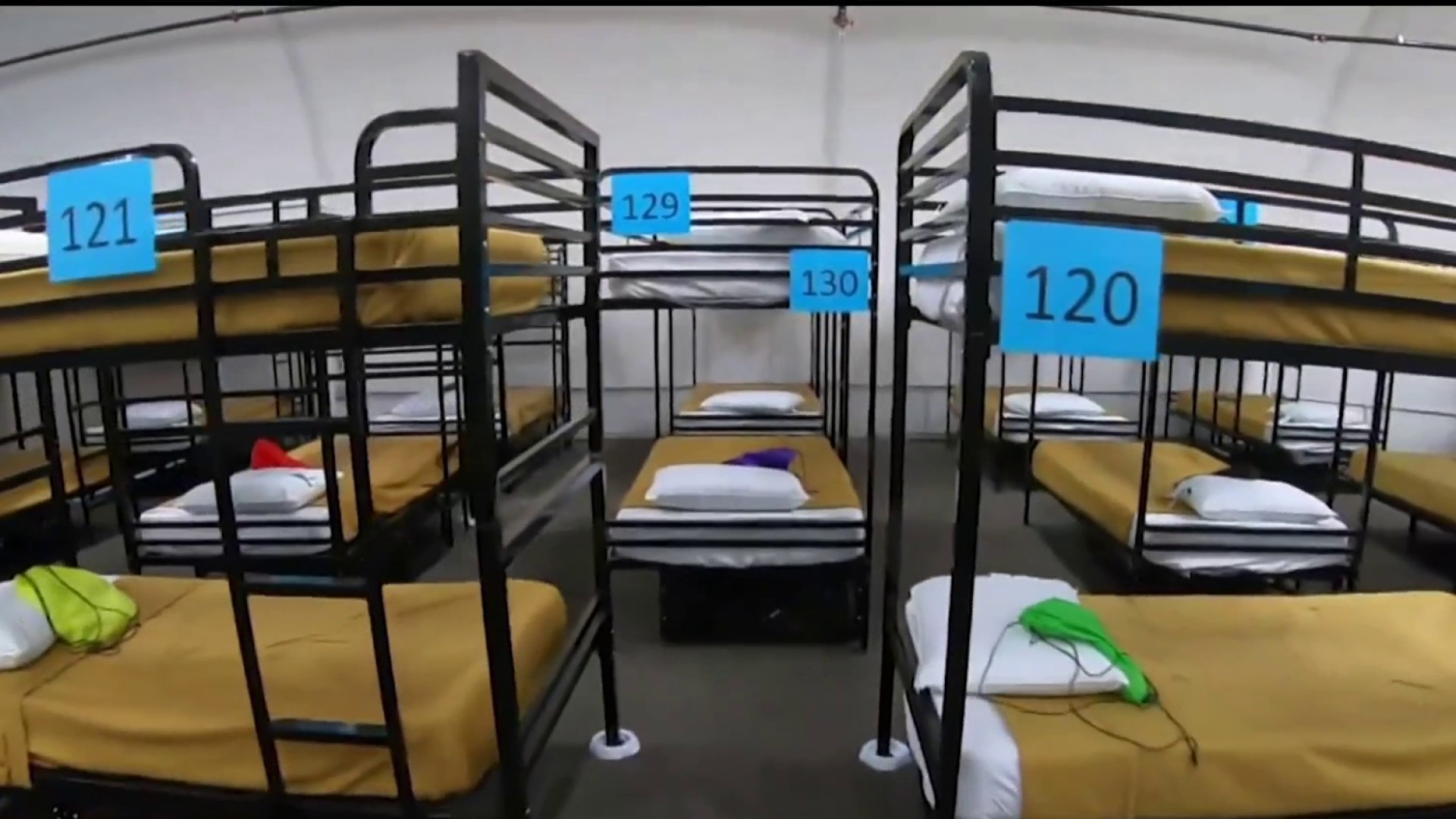After hearing hours of public comment, the San Diego City Council Tuesday evening voted 5-4 in favor of the Unsafe Camping Ordinance that would prohibit tent encampments in all public spaces throughout the city if shelter beds are available
Mayor Todd Gloria has pushed hard for proposed the ordinance introduced by City Councilman Stephen Whitburn, including asking the public to sign a petition and speaking on the issue at news conferences.
The proposal would also ban tent encampments at all times in certain sensitive areas -- parks, canyons and near schools, transit stations and homeless shelters -- regardless of shelter capacity.
Along with Whitburn, City Council members Jennifer Campbell, Raul Campillo, Joe LaCava and Marni Von Wilpert voted yes.
Get top local stories in San Diego delivered to you every morning. >Sign up for NBC San Diego's News Headlines newsletter.
San Diego Homelessness
"It takes a lot of bravery to do this," Campbell said, referring to Gloria's and Whitburn's proposal.
"This is a win-win ordinance," she added, because the homeless will have access to services while families won't have to navigate around tents on the streets.
Council President Sean Elo-Rivera and colleagues Kent Lee, Monica Montgomery Steppe and Vivian Moreno voted against the proposal.
Moreno, who suggested continuing a vote on the ordinance until September, said she was concerned about whether police officers would have the necessary resources to enforce any new policy, given residents false hope.
Moreno said her constituents believe the number of homeless "would never be tolerated in other parts of this city -- and they're right."
Passing a new law with no real plan "would achieve very little," she added.
Based on the suggestions of three council members, the ordinance was amended to include a working group to monitor how the ordinance is carried out, and specific enforcement for parks, beaches and open space.
Under an amendment by Von Wilpert, the ordinance won*t take effect until 30 days after the first safe sleeping lot is opened on 20th and B streets, to allow non-law enforcement social workers to be the first contact with homeless people. In a statement after the vote, Gloria thanked the five who supported it.
Many speakers during the four-hour public comment segment of Tuesday's council meeting were opposed to the proposed ordinance, saying it was cruel and wouldn't solve the bigger problem.
Barbara Pinto, a member of the Alliance of Californians for Community Empowerment, compared the proposal "to pouring water on a drowning man."
Pinto urged the council to focus on providing more affordable housing. Others suggested the council either table the proposal or scrap the plan altogether and craft a new one. More than a few opponents urged the council to go with 2019 community action plan to tackle homelessness.
Addressing the council, Gloria said it was reasonable to ask that sidewalks are passable, that public parks are safe and accessible, and that natural canyons aren't under a constant wildfire threat.
"This ordinance is a call to action, and a call to uphold the principals of compassion, fairness and personal responsibility," he added.
A woman who said she was a member of the Coastal Coalition, said failing to support this ordinance is failure to protect the community and homeless people.
"This ordinance is the key to success for both sides," she said. "Pass it, staff it, fund it, enforce it."
Gloria said earlier that encampments "pose an immediate threat to public health and safety, for both the people living in them and people living, working or going to school around them."
"Those living in encampments are in constant danger of disease spread amid unsanitary conditions, violence and exploitation by dealers of deadly drugs," he added. "Encampments also frequently ignite fires that put the public and our first responders at great risk. The City Council must pass the Unsafe Camping Ordinance to protect the health and safety of all San Diegans."
However, opponents say the proposed ordinance won't solve the issue and would essentially make being homeless illegal in San Diego, pushing people experiencing homelessness into other neighborhoods or cities.
Large portions of downtown San Diego, Mission Beach, Old Town and Midway would be off-limits under the proposal. Gloria has proposed several in- city campsites to accommodate some people experiencing homelessness.
"This commonsense ordinance will be paired with a robust shelter strategy, which includes two new Safe Sleeping sites where more than 500 people stay in tents in secure areas with access to hygiene and services that will help them get on the path to permanent housing," Gloria said.
"Letting people continue to live in squalor on our sidewalks is not showing compassion; it's showing indifference. We won't let that be the case in our city."
The Safe Sleeping Program sites would be located in Balboa Park at the 20th and B Street lot and Parking Lot O. The program would also provide bathrooms, security and other services for unsheltered individuals. Gloria said he expects one of the sites to open soon after the vote and another in the fall.
A report released last week by the Office of the Independent Budget Analyst said the details of the ordinance, how it will be funded and enforced, remain a mystery.
"Long-term fiscal impacts associated with ordinance implementation remain largely unknown; while (the San Diego Police Department) and (Environmental Services Department) indicate that they may be able to absorb potential costs initially, council should monitor both operational impacts and potential costs during implementation of the ordinance if enacted," the report said.
"We suggest that council request regular reports on the implementation and effectiveness of this ordinance which could shed light on this matter."
San Diego City Councilman Joe LaCava supported the proposed ordinance, but said he needed to see evidence it was helping people after implementation before he was satisfied with it.
"Implementation is key to the success of the Unauthorized Camping Ordinance, and I will measure its success on shelter placements and connecting homeless San Diegans to support systems," he said. "Accomplishing this lies in the implementation and our ability to equally protect unsheltered individuals and families, surrounding communities, and city staff.
"We have invested a lot to this point, and I will not risk sacrificing the hard-earned relationships and tenuous safety nets that our outreach teams have built with unsheltered individuals," LaCava said.



